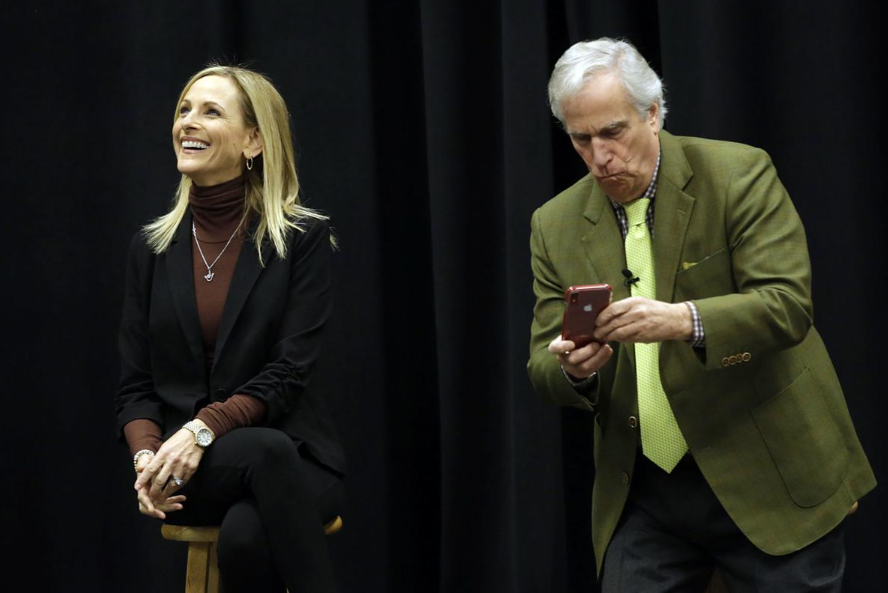Photo: Henry Winkler and Marlee Matlin visit with local students before taking the stage at Tulsa Town Hall on Friday. MIKE SIMONS/Tulsa World
By James D. Watts Jr.
Tulsa World
Feb 8, 2020
When Marlee Matlin was 12 years old, she got the chance to meet the most famous person in the country. And she knew exactly what she wanted to say when they met.
“I went up to him,” Matlin said, “and I said, ‘I want to be an actor just like you.’”
The person to whom Matlin addressed this declaration was Henry Winkler, the actor who at the time was playing the now-iconic character of Arthur “Fonzie” Fonzarelli on the hit TV series “Happy Days.”
Winkler and Matlin were in Tulsa on Friday as guests of Tulsa Town Hall, sharing stories about their long-lived friendship, offering words of encouragement to people of all ages to pursue their dreams — and cracking a joke or two along the way.
What led to Winkler and Matlin’s first meeting was softball. Winkler and his “Happy Days” colleagues were touring the country, playing softball games at major league stadiums.
One of the stops on the tour was Chicago’s Wrigley Field, and in the course of the visit, Winkler attended a performance at the International Center on Deafness and the Arts that featured Matlin.
“Here was this 12-year-old girl dancing to music she could not hear,” Winkler recalled, “and I started to cry. Not because I thought it was sad that she couldn’t hear the music but because she danced with such passion, determination and grace. Her energy just flowed off the stage and into the Winklers’ hearts.”
After the performance, and after Matlin made her career goals known, Matlin’s mother asked to speak with Winkler.
“She said, ‘Please tell her not to be an actress,’ ” Winkler said. “And I said, ‘You picked the wrong guy.’”
“I know my mother was just being a mother — a Jewish mother — and was just trying to protect me,” Matlin said, her American Sign Language interpreted for hearing audience members by her long-time interpreter, Jack Jason.
“Henry listened to her politely, then turned to me and said, ‘You can be whatever you want to be.’
“And eight years later,” Matlin said, “I was on a stage with an Oscar in my hand.”
The Oscar was for Matlin’s performance in the 1986 film “Children of a Lesser God,” which made her the youngest person ever to win the Academy Award for Best Actress and the only deaf performer to win an Academy Award.
Winkler and Matlin stayed in touch after that first meeting, to the point that when some critics dismissed her Oscar victory as the result of a “pity vote,” it was Winkler to whom Matlin turned for advice.
And, it turned out, a place to stay.
“You invited me to stay the weekend,” Matlin said.
“And two and a half years later you moved out,” Winkler said.
But in that time living with Winkler and his family, Matlin said, she found the inspiration to take control of her life and career, leading to her forming her own production company, starring in the TV series “Reasonable Doubts,” and appearing in a wide range of films and TV shows while also working as an advocate for several causes, including support of the bill that requires televisions to come equipped with closed-caption technology.
“Many people may think I live in a silent world,” Matlin said, “but silence is the last thing people will hear from me.”
Winkler, who co-stars with Tulsa native Bill Hader in the HBO series “Barry,” is himself familiar with adversity.
He said it wasn’t until he was 31 that he was diagnosed with dyslexia. His academic struggles were such that even his parents would call him “dummer Hund,” the German phrase for “dumb dog.”
Yet, Winkler said, from an early age he knew he wanted to be an actor.
“I really don’t know why, don’t know how, but at age 7 I knew I wanted to be an actor,” Winkler said.
“My father wanted me to go into the family business, buying and selling wood. But the only wood I was interested in was Hollywood.”
He said it was the music teacher at his high school who gave him the inspiration to pursue his acting dreams.
“He told me, ‘Winkler, if you ever do graduate, you’re going to be great,’” Winkler said. “I held on to that one sentence and ran with it, because you have no idea what you can accomplish until you do it.”
For Winkler, those accomplishments include writing 35 children’s books in collaboration with Lin Oliver, including a series about Hank Zipzer, a fourth-grader with dyslexia.
“You have greatness inside you,” Winkler said. “The world needs everything you have to offer. It could be you have a gift for doing logarithms, or soccer, or plumbing, or dancing.
“I know our country is already great, and it will stay that way as long as we encourage every gift each of us has to flourish.”





